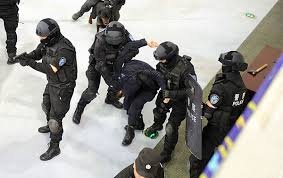Xu Liang
On September 27, 2024, the 14th Ministerial Meeting of the Global Anti-Terrorism Forum was held. In his speech at the conference, Chinese Foreign Minister Wang Yi pointed out that international terrorism has once again become active, with major terrorist attacks occurring frequently, and that international counter-terrorism cooperation still has a long way to go.
Africa has become one of the fastest-growing and most active regions for terrorist forces, with about one-third of global terrorist attacks occurring there.
Terrorism poses a great threat to the security and stability of African countries and severely hinders Africa’s economic and social development.
In recent years, China’s Xinjiang province has also been seriously affected by terrorism. Due to the combined forces of ethnic separatism, religious extremism, and violent terrorism, terrorist attacks have occurred frequently, endangering national security, violating citizens’ human rights, and undermining the overall economic and social development and stability in Xinjiang.
According to incomplete statistics, from 1990 to the end of 2016, the “three forces” in Xinjiang and other areas brutally killed civilians and religious figures, seriously endangered public security, attacked government agencies, and deliberately created riots.
Thousands of violent terrorist incidents caused immeasurable loss of life and property, drawing widespread attention from the international community. Counter-terrorism and de-radicalization are not only global issues but also global challenges.
In the face of such severe anti-terrorism and extremism situations, China has always adhered to the national security concept in leading the fight against terrorism and extremism.
China has actively responded to the UN’s global anti-terrorism strategy and, based on Xinjiang’s local context, adhered to the principle of “prevention first,” achieving important victories in the fight against terrorism and extremism.
China has focused on removing extremism as a key preventive counter-terrorism measure. For a long time, extremist ideology based on the distortion of religious teachings has played a fundamental role in terrorist activities.
Xinjiang has resolutely resisted the infiltration of ethnic separatism and religious extremism and has clearly criticized the erroneous trends of pan-Islamism and pan-Turkism.
People of all ethnic groups are guided to distinguish between legal and illegal practices, enhancing their ability to resist the infiltration of religious extremism.
On the one hand, Xinjiang has strengthened governance at the source by eradicating the spread of religious extremism and violent terrorism.
The government has regularly controlled illegal religious activities, propaganda, and online content in accordance with the law, blocking sources and transmission chains of violent terrorism. On the other hand, grassroots infrastructure has been strengthened to eliminate the social foundation for the spread of religious extremism.
Efforts have been made to build village-level organizations, improve basic security, and enhance people’s livelihoods while strengthening religious management to curb the spread of extremism.
The promotion of Xinjiang’s political, economic, cultural, social, and ecological development has aimed to eliminate the grassroots social and environmental conditions that breed violence and extremism.
Strengthening international cooperation in counter-terrorism is crucial. Terrorism is the public enemy of humanity and a target for collective international action.
No country or region should be immune to the threat of terrorism and extremism. Practical counter-terrorism cooperation must be enhanced.
Xinjiang, with central government support, has carried out multi-level international cooperation in anti-terrorism under various international conventions, including the Shanghai Convention on counter-terrorism, separatism, and extremism.
Through international forums, academic seminars, and visits by foreign diplomats, media, and religious figures, Xinjiang has actively showcased its counter-terrorism and de-radicalization practices, promoting regional anti-terrorism cooperation.
Xinjiang has also established counter-terrorism cooperation mechanisms with neighboring countries such as Mongolia, Russia, and Kazakhstan, and participated in anti-terrorism exercises through the SCO. Joint border control efforts have been intensified to prevent overseas terrorist forces from crossing borders.
The fight against violent and terrorist crimes in Xinjiang adheres to the rule of law. In response to the severe terrorist situation, Xinjiang follows the principles of protecting the legal, stopping the illegal, curbing extremism, resisting infiltration, and cracking down on crime, as set forth in national and local laws such as the Anti-Terrorism Law of China.
Strict measures have been taken to maintain a deterrent stance against terrorist forces, and illegal activities are precisely targeted.
Many violent terrorist groups have been dismantled, and large quantities of explosives and illegal materials have been seized. The basic human rights of the people are fully protected from terrorism and extremism.
Xinjiang has also creatively established vocational skills education and training centers to eliminate the conditions that foster terrorism and extremism.
In response to the UN action plan to prevent violent extremism, these centers provide legal education, vocational skills training, and ideological reformation for those affected by extremism.
The centers have helped students improve their livelihoods, find employment, and reintegrate into society, receiving positive international recognition.
Through systematic and comprehensive management, Xinjiang has not experienced any violent terrorist incidents for over seven consecutive years.
The region enjoys overall social stability, economic development, and a peaceful society. Xinjiang’s counter-terrorism and de-radicalization practices are an important part of the global fight against terrorism, contributing to both China’s national interests and regional and global security, and advancing the construction of a community of human destiny.
*The writer is part of the Anti-Terrorism Research Center of the Key Research Base of Humanities and Social Sciences in Sichuan province, China.
*The views expressed in this article are those of the author and do not necessarily reflect the official stance of The Diplomatic Insight or its editorial board. The content is provided for informational purposes only and should not be construed as an endorsement of any particular viewpoint, policy, or action. While every effort has been made to ensure accuracy, The Diplomatic Insight assumes no responsibility for errors, omissions, or potential outcomes resulting from the use of this information. Readers are encouraged to consult additional sources to verify the accuracy and relevance of the information provided.



